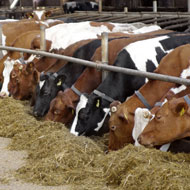Model farm goes on display in London

Members of the public can become a 'virtual farmer' using a computer simulation to design a cow diet.
A 'model farm' on display in London this week allows members of the public to design a cow's diet to reduce methane emissions.
As an average cow produces 1000 times more methane than a human, meat production plays an important role in greenhouse gas emissions.
Academics from the University of Bristol teamed up with Rothamsted Research's North Wyke Farm in Devon to show how the sustainable grazing of cows and sheep can contribute to food security in Britain.
The team merged technology with traditional farming techniques to develop the model farm, which is the first of its kind in the world.
It is on display until Sunday 5 July at the Royal Society Summer Science Exhibition, where visitors can become a 'virtual farmer' using a computer simulation to design a cow diet.
'The Real Beef About Meat' exhibit has been put together with Rothamsted Research and the universities of Exeter and Reading.
Professor Michael Lee, head of site at North Wyke, commented: "Likely benefits of designing environmentally optimal livestock grazing systems may include the reduced need for fertiliser application, increased production and nutritional quality, low gas emissions and the support of biodiversity and the provision of ecosystem services.
"There are, of course, possible trade-offs associated with designing livestock grazing systems which need consideration and discussion."



 The latest
The latest